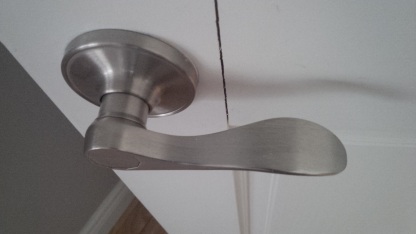My recent op-ed published at the Chronicle Herald assumed that banning round door knobs in private residences in Halifax was a logical probability and might come much later. From first reports, it seemed Coun. Jennifer Watts was only considering public spaces. Then I read this, and realised that I was wrong.
It is worth quoting the relevant part from a CBC interview:
Coun. Jennifer Watts said it’s time to consider taking [the notion of compelling people to use lever door handles] further to cover private homes.
‘Very small things, but if they actually are implemented, then they could make a huge difference in terms of how someone feels inside their home space that is more friendly, more accessible and much easier to use.’
This imposition on personal spaces is not about access to the disabled anymore.

As in Vancouver, a Halifax municipal councillor wants to ban round door knobs and make lever handles compulsory even in private homes.
The question of door knobs seems trivial, and many of us might are inclined to dismiss it. Why should we care?
For one, perhaps because it is a trivial thing, citizens should be concerned that elected officials are spending time on that question when there are so many more important business to look after.
More substantively, it is a dangerous infringement of the personal. I don’t mean to say that Ms. Watts’ intentions are nefarious. I simply mean to point out that crossing the line between the personal and the political threatens personal liberty.
The political is that which deals with public things. Whether it is one person or many making decisions, political decisions are those that affect the collective. Increasing sale taxes is one example. The personal is that which involves personal decisions that have minimal or no public dimension.
Ideally, the personal and the political would be clearly delineated. The difference is not always clear. It is a personal decision to decide what clothes to wear at home or on the streets but it is not so personal to decide whether to wear clothing at a public venue.
It is similar with doorknobs. Mandating them for public buildings of which officials are in charge is one thing, silly or dangerous as it may be. Imposing them in the private homes of private citizens is another.
The dangerous part comes in allowing government officials to make decisions for us on private matters and on matters of taste, and worse still when officials make claim to want to make us more comfortable in our own homes.
If personal space is not a limit, where then does it stop?
If an employer dared to make a rule about what furniture employees ought to have in their homes for the sake of making employees feel more comfortable, we would recoil. Why would Haligonians accept a similar suggestion from someone they themselves employ?
If we accept that politicians make such trivial and personal decisions for adult citizens, condescension aside, we then open the door to a loss of autonomy in the subjection of one’s adult will to another. In turn, that subjection is the birth of tyranny, however benevolent, because rules typically require enforcement (Language regulations in Quebec logically necessitated a language police, so it’s not far-fetched to imagine a knob police paying is a visit to make sure we are comfortable at home).
Given the weaknesses of the human soul, it is never advisable to surrender our personal liberty, whether in installments or wholesale.
For these reasons, the door knob question, as trivial as it may sound, is more important than just door knobs. In a free society, citizens should never tolerate that laws be made about their comfort in their own homes. The wisdom bundled into the belief that home is a citizen’s castle serves to signify that using legislation to get into people’s homes is illegitimate.
That’s why we should care about laws crafted to tell us what kind of door handle we can and can not use in our private homes.
Good points: you could have added mandatory wheelchair ramps in private homes as a logical next step in creating a friendlier environment for mobility-impaired citizens. I appreciate your efforts to keep the nose of this camel out of our collective tents.
This kind f control over our private lives is unacceptable and where will it stop. What is next? Banning houses with stairs in case a child falls down or at some point someone will be unable to deal with steps. Give us a break , please. Surely people can take some responsibility for themselves and install the kind of door hardware they need.